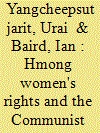|
|
|
Sort Order |
|
|
|
Items / Page
|
|
|
|
|
|
|
| Srl | Item |
| 1 |
ID:
188719


|
|
|
|
|
| Summary/Abstract |
Between 1967 and 1969, thousands of Hmong in northern Thailand became aligned with the Communist Party of Thailand (CPT) and resided in mountainous strongholds near the border with Laos in Chiang Rai, Phayao, Nan, Phetchabun, and Phitsanulok provinces, and in Tak province near the border with Burma. They stayed in these strongholds until the early 1980s, when the CPT fell apart. During the CPT period, some important transformations in Hmong gender relations occurred, especially relative to the traditional strongly male-dominated society. We describe the most important changes, as reported by Hmong women. The legacy of the CPT period remains today. However, there has been some reversion to pre-CPT patriarchal practices. Some Hmong women feel nostalgic about the rights they enjoyed during the CPT period, although the leadership of the CPT was male dominated, and despite the fact that some progress has been made, for example, in convincing clan leaders to allow divorced women to return to their birth clans. This study applies a feminist geography and social memory theoretical framework to examine Hmong women's life stories about their time with the CPT.
|
|
|
|
|
|
|
|
|
|
|
|
|
|
|
|
| 2 |
ID:
153002


|
|
|
|
|
| Summary/Abstract |
On 22 May 2014, the Thai military conducted a coup d’état and discarded the previous constitution. In April 2015, a new draft constitution was prepared. Although eventually rejected by the military, it represented an exciting moment for activists, as it recognized the existence of ‘indigenous peoples’ (referred to as chon pheun muang in the draft). This prompted us to conduct interviews in 2015–2016 with people belonging to four different ethnic groups and living mainly in Chiang Mai province, northern Thailand: the Lua, Khon Muang, Hmong, and Lisu, in order to determine their understandings of who should be considered ‘indigenous peoples’, and what rights should they have. The findings indicate that there is considerable variation amongst people regarding the meaning of the term ‘indigenous peoples’; who should be considered indigenous; and what rights those defined as being indigenous should be entitled to.
|
|
|
|
|
|
|
|
|
|
|
|
|
|
|
|
|
|
|
|
|